新编剑桥商务英语unit_3 答案
- 格式:ppt
- 大小:1.78 MB
- 文档页数:27
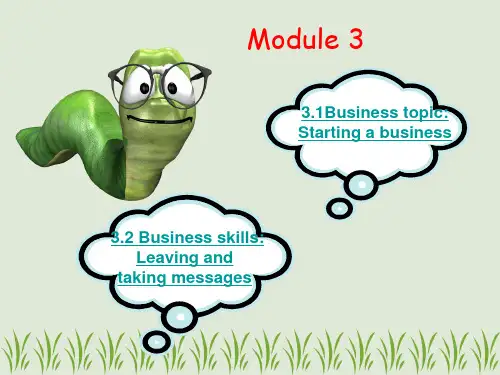
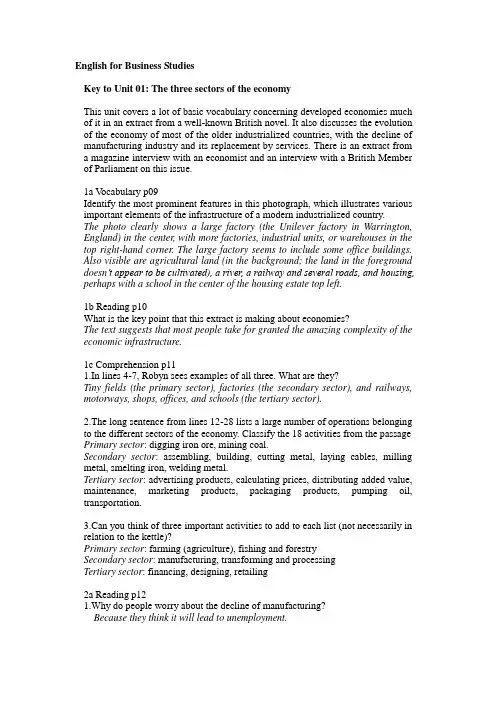
English for Business StudiesKey to Unit 01: The three sectors of the economyThis unit covers a lot of basic vocabulary concerning developed economies much of it in an extract from a well-known British novel. It also discusses the evolution of the economy of most of the older industrialized countries, with the decline of manufacturing industry and its replacement by services. There is an extract from a magazine interview with an economist and an interview with a British Member of Parliament on this issue.1a V ocabulary p09Identify the most prominent features in this photograph, which illustrates various important elements of the infrastructure of a modern industrialized country.The photo clearly shows a large factory (the Unilever factory in Warrington, England) in the center, with more factories, industrial units, or warehouses in the top right-hand corner. The large factory seems to include some office buildings. Also visible are agricultural land (in the background; the land in the foreground doesn’t appear to be cultivated), a river, a railway and several roads, and housing, perhaps with a school in the center of the housing estate top left.1b Reading p10What is the key point that this extract is making about economies?The text suggests that most people take for granted the amazing complexity of the economic infrastructure.1c Comprehension p111.In lines 4-7, Robyn sees examples of all three. What are they?Tiny fields (the primary sector), factories (the secondary sector), and railways, motorways, shops, offices, and schools (the tertiary sector).2.The long sentence from lines 12-28 lists a large number of operations belonging to the different sectors of the economy. Classify the 18 activities from the passage Primary sector: digging iron ore, mining coal.Secondary sector: assembling, building, cutting metal, laying cables, milling metal, smelting iron, welding metal.Tertiary sector: advertising products, calculating prices, distributing added value, maintenance, marketing products, packaging products, pumping oil, transportation.3.Can you think of three important activities to add to each list (not necessarily in relation to the kettle)?Primary sector: farming (agriculture), fishing and forestrySecondary sector: manufacturing, transforming and processingTertiary sector: financing, designing, retailing2a Reading p121.Why do people worry about the decline of manufacturing?Because they think it will lead to unemployment.2.Which activities are as important as the production of goods?Designing goods, persuading people to buy them; arts and entertainment.3.Should people worry about this state of affairs?No, because it is a natural, progressive and inevitable development.2b Listening p13Listen to a short interview with Denis MacShane, a British Member of Parliament for the Labor Party.Does he hold the same view as J. K. Galbraith?Denis MacShane quite clearly disagrees with Galbraith.1.Why does MacShane think that manufacturing has a future?Because there are many new products that have to be invented to serve new needs.2.Why does MacShane think that manufacturing has a future in the advanced countries?Because these countries have production technology that requires very little labor input.3.Why, however, is this manufacturing unlikely to solve the problem of unemployment?Precisely because it requires very little labor input.4.What does MacShane mean by ‗in theory there should be no more manufacturing‘ in Switzerland? (It is this theory that makes many people argue that m anufacturing must move to ‗less-developed‘ countries.)The conventional theory is that the most important cost in manufacturing is labor, and wages and salaries in Switzerland are the highest in the world. (As is the cost of living!)5.Why does he say it is surprising for a British company to be buying Swiss goods?Because the pound sterling has, over the years, lost a great deal of value against foreign currencies, especially the Swiss franc.6.What is the reason he gives for the United States still being the richest nation in the world?It has a successful manufacturing economy, including its computer and car (automobile) industries.7.Match up the following expressions and definitions:1.to convert itself. B/ to change from one thing to another2.to serve needs D/ to satisfy people’s desires or requirementsbor input A/ manual work4.to stumble on E/ to discover something by accident5.to be dubious C/ to be uncertain, disbelieving2c Writing p13Summarize both Gallbraith‘s and MacShane‘s arguments in a short paragraph of fewer then 50 words.A POSSIBLE SUMMARY Galbraith says that manufacturing industry will inevitably decline in the advanced industrial countries, and be replaced by design, advertising, entertainment, and so on. MaShane says that manufacturing will change, and make new products with new technology.New words in this unit 01agriculture, business, company, consumer, economic, economy, employment, goods, industry, infrastructure, labour, manufacturing, primary sector, product, raw materials, secondary sector, tertiary sector, unemploymentUnit 2 ManagementManagement is important. The success or failure of business organizations, government institutions and public sector services, voluntary and non-profit organizations, sports teams, and so on, often depends on the quality of their management. This unit includes a discussion of the qualities required by managers, a definition of management, consideration of the role of the meetings in management, a critical view of the management of one large American multinational company, and an interview with the manager of a British department store, who discusses his job.Before the discussion on the qualities required by managers and the definition of management, maybe we can discuss the cartoo n. What‘s the joke? We can assume that Mr. Farvis runs this company (his name is on the door). What can we say about his managerial skills, or his apparent lack of them?Discuss in pairs for two minutes what exactly managers do, concerning organizing, setting objectives, allocating tasks and resources, communicating, motivating, and so on.1a DiscussionWhat is management? Is it an art or a science? An instinct or a set of skills and techniques that can be taught?Management is a mixture of innate qualities and learnable skills and techniques.What do you think makes a good manager? Which four of the following qualities do you think are the most important?Being decisive: able to make quick decisionsBeing efficient: doing things quickly, not leaving tasks unfinished, having a tidy desk, and so onBeing friendly and sociableBeing able to communicate with people -----Being logical, rational and analyticalBeing able to motivate and inspire and lead people -----Being authoritative: able to give ordersBe ing competent: knowing one’s job perfectly, as well as the work of one’s subordinates -----Being persuasive: able to convince people to do thingsHaving good ideas -----Are there any qualities that you think should be added to this list?Which of these qualities can be acquired? Which must you be born with?There are clearly no definitive answers as to which of these skills can be acquired.1b ReadingPeter Drucker, the (Austrian-born) American management professor and consultant, is the author of many books about business. This text summarizes some of Peter Drucker‘s views on management. It paraphrases the extended definition of management he gives in one of his management textbooks. As you read about his description of the work of a manager, decide whether the five different functions he mentions require the four qualities you selected in your discussion, or others you did not choose.What is management?Drucker’s first point (setting objectives and developing strategies) presumably requires qualities J, H, E and A (not necessarily in that order). The second point (organizing) presumably also requires H, E and J. The third point (motivation and communication) embraces F, D, I and probably C. The fourth point (measuring performance) probably requires H and E. The fifth point (developing people) might require H, F, D and J. But all this is clearly open to discussion.1c V ocabularyComplete the following sentences with these words.Achieved; board of directors; communicate; innovations; manageable; performance; resources; setting; supervise1.managers have to decide how best to allocate the human, physical and capitalresources available to them.2.Managers -- logically – have to make sure that the jobs and tasks given to theirsubordinates are manageable.3.There is no point in setting objectives if you don‘t communicate them to yourstaff.4.Managers have to supervise their subordinates, and to measure, and try toimprove, their performance.5.Managers have to check whether objectives and targets are being achieved.6.A top manager whose performance is unsatisfactory can be dismissed by thecompany‘s board of directors.7.Top managers are responsible for the innovations that will allow a company toadapt to a changing world.1d V ocabularyThe text contains a number of common verb-noun partnerships (e.g. achieve objectives, deal with crises, and so on).Match up these verbs and nouns to make common collocations.Allocate resources (or people)Communicate information (or decisions)Develop strategies (or people or subordinates)Make decisionsMeasure performanceMotivate peoplePerform jobsSet objectivesSupervise subordinates2 Meetings‘One can either work or meet. One cannot do both at the same time.’(Peter Drucker: An Introductory View of Management)What do you think Peter Drucker means by this comment?Drucker obviously believes that work is largely something that is done individually, and that meetings are not ‘work’, but merely preparation for it, or consolidation after it.2a Reading p18Read the computer journalist Robert X. Cringely‘s description of the management style at IBM.Is he positive or negative about IBM‘s working culture?Robert Cringely’s history of the personal computer industry is very informative, in places very critical, and also very funny. In this extract, he is extremely negative about IBM, saying that they put much too much effort into management and worrying about the possibility of making bad decisions, and not enough into producing good, competitively-priced products.2b ComprehensionExplain in your own words exactly what Robert Cringely means in the following sentences.1.Every IBM employee‘s ambition is apparently to become a manager.It seems as if the people who work for IBM are more interested in being regarded as a manager than as a computer designer or technician2.IBM makes management the company‘s single biggest business.IBM’s corporate culture seems to place more emphasis on management than on developing and selling the company’s products.3.IBM executives manage the design and writing of software.IBM’s managers don’t actually do the work of designing and writing software themselves, but organize and supervise the people who do it.4.IBM products aren‘t often very competitive.IBM products are rarely as good or as dheap as similar products made by their competitors5.The safety net at IBM is so big it is hard to make a bad decision.There is an extensive hierarchy and a system of checks and controls whichensures that bad decisions are generally avoided (but good decisions also take a very long time to make).6.This will be the source of the company‘s ultimate downfall.The slowness of IBM’s decision-making process (and the consequent lack of competitiveness of their products) will eventually destroy the company.2c V ocabulary p18Find word in the text that mean the same as the words or expressions below.1.seemingly apparentlyputer programs software3.work, time and energy effortputers (and other machines) hardware5.young workers still learning their jobs trainees6.knowledge and skill expertise7.levels or strata layers8.to make certain that something is true verify9.corrected or slightly changed amended10.collapse or failure downfall3 The retail sectorYou will hear part of an interview with Steve Moody, the manager of the Marks & Spencer store in Cambridge, England.What do you know about Marks & Spencer?M&S, as many people call them in Britain sell clothes, household goods and food. They have branches all over Britain, and are expanding into continental Europe. 3a Listeninglisten to part One, in which Steve Moody describes the role and responsibilities of a store manager.Tapesript Part OneSTEVE MOODY so, as the store manager in Cambridge, which is probably the fortieth largest of the 280 stores we have got, I am responsible for the day-to-day running of the store. All the product is delivered to me in predescribed quantities, and obviously I’m responsible for displaying that merchandise to its best advantage, obviously I’m responsible for employing the staff to actually sel l that merchandise, and organizing the day-to-day logistics of the operation. Much more running stores is about the day-to-day operation. And ensuring that that’s safe, and obviously because of the two hundred people that we would normally have working her e it’s ensuring that they are well trained, that they are well motivated, and that the environment they work in is a pleasant one, that they are treated with respect, and that they are committed to the company’s principles. Which of the following tasks is he responsible for?1.designing the store and its layout2.displaying the merchandise3.employing the sales staff4.ensuring the safety of staff and customers5.establishing the company‘s principles6.getting commitment from the staff7.increasing profits8.maintaining a pleasant working environment9.motivating staffanizing the day-to-day logistics11.pricing the merchandise12.running 40 out of 280 stores13.selecting the merchandise14.supervising the day-to-day running of the store15.training staff3b ListeningListen to Part Two, and answer these questions.Tapescript Part TwoINTERVIEWER How much freedom do those people have within their jobs to make decisions themselves? How much delegation is there of responsibility down the chain?STEVE MOODY We would , as a business, like to encourage as much accountability and delegation as possible. Of course that does depend on the abilities of the individuals, the environment in which you’re working, and the time of year. With 282 stores we have a corporate appearance in the United Ki ngdom’s high streets. It is quite important that when customers come into Marks & Spencer’s Cambridge they get the same appearance and type of looking store and the same level of service that they would expect if they went into Marks & Spencer’s Edinburgh in Scotland, for example, and it’s very important that we have a corporate statement that customers understand. So, there are obviously parameters and disciplines that, you know, not only the staff but supervision and management would follow. Within that, in terms of development and training, training is obviously an investment for all staff. If staff are trained to do their job well and they understand it, they will feel confident in what they’re doing, that in turn will give a better service to the customers, obviously from Marks & Spencer’s point of view it could well lead to increased sales.1.Why are Marks & Spencer‘s store managers limited in giving accountability totheir staff and delegating responsibilities?Although marks & Spencer ‘would like to en courage as much accountability and delegation as possible’, they have a corporate appearance for all their stores, in all of which customers should get the same level of service. This limits the freedom of individual mangers to change the stores: there are ‘parameters and disciplines that not only the staff but supervision and management would follow’.2.What do they concentrate on instead?Instead, they concentrate on staff development and training.3c listeninglisten to Part Three, and answer the following questions.Tapescript Part ThreeINTERVIEWER Do you have meetings for members of staff where they can express views about what’s going on in the store?STEVE MOODY We have a series of meetings, management and supervisoryevery week we have something whi ch Marks & Spencer’s call a focus group, which is members of staff who get together regularly from all areas of the store, so from the food section and perhaps the menswear section, from the office who do the stock and accounting, and indeed the warehouse where people receive goods. They have meetings, they discuss issues, they discuss problems that they feel are going on in the store. They also discuss suggestions of how they can improve that we run the store, and they discuss that amongst themselves first. They will then have a meeting with members of management and obviously myself, and we will discuss those issues and work together to try and provide solutions. However, Marks & Spencer’s philosophy, I suppose, is that meetings should not be substitute for day-to-day communication and therefore if problems do arise in terms of the operation, or an individual has got a problem in their working environment, or indde their immediate line manager, or indeed if they have a problem outside, which might be domestic, or with their family, we would like to discuss that as it arises and would like to encourage a policy that they will come and talk to their supervisor or their manager, to see what we can do to solve the problem.Steve Moody mentions two kinds of regular meetings. The first is weekly meetings for management and supervisory staff.1.What is the second kind of meeting called?A focus group.2.Who attends them?Members of staff from all areas of the store (e.g. the food section, the menswear section, the stock and accounting office, the warehouse, and so).3.What are they designed to achieve?Staff can discuss problems in the store, and make suggestions for improvements. After this, they will meet with members of management to discuss those issues and try to provide solutions.4.What kind of problems cannot be dealt with by meetings?Individuals’ problems with their work or their line manager, or even family problems5.How are such problems dealt with?Individuals are encouraged to discuss such problems with their supervisor or manager.3d DiscussionAfter reading and hearing about management, do you think you have the right skills to be a manager? Would you be able, for example, to set objectives, motivate and coordinate the staff, and manage a department store, or a computer manufacturer?Some learners may decide that they have the necessary abilities to become a manager or even a top manager; others may envisage more specialized careers in a particular function such as marketing, finance, computing, accounting, and so on, which will not involve managing and coordinating a large number of people and operations.New words in this unit 02Allocate, banker, board of directors, chairman, competitive, customer, director, distributor, function, hardware, innovation, investor, logistics, manageable, management, manager, measure, meeting, merchandise, motivate, objective, organization, pay, performance, promotion, resources, software, staff, strategy, subordinate, supervise, supplier, tactics, team, top manager, trainee.Unit 3 Company structureOne of the most important tasks for the management of any organization employing more than a few people is to determine its organizational structure, and to change this when and where necessary. This unit contains a text which outlines the most common organizational systems and exercise which focuses on the potential conflicts among the different departments of a manufacturing organization, an example of an organization chart, and a critical look at the flexible organizational structure of an American computer company.1a DiscussionThis discussion activity follows on naturally from activity 3d in the previous unit, about managing companies or having more limited responsibilities in a particular department.1b V ocabulary1. Autonomous: C independent, able to take decisions without consulting a higher authority2. Decentralization: E dividing an organization into decision-making units that are not centrally controlled.3. Function: B a specific activity in a company, e.g. production, marketing, finance4. Hierarchy: A system of authority with different levels, one above the other.5. Line authority: F the power to give instructions to people at the level below in the chain of command6. Report to: G to be responsible to someone and to take instructions from him or her7. Subordinates: D people working under someone else in a hierarchy1c ReadingThe text summarizes the most common ways in which companies and other organizations are structured, and mentions the people usually credited with inventing functional organization and decentralization. It mentions the more recent development of matrix management, and a well-known objection to it. How arte most organizations structured?Most companies are too large to be organized as a single hierarchy. The hierarchy is usually divided up. In what way?What are the obvious disadvantages of functional structure?(Discuss briefly in pairs) give some examples of standard conflicts in companies between departments with different objectivesAre there any other ways of organizing companies that might solve theseproblems?A.Functional structureB.Matrix structureC.Line structureD.Staff structureBritish: personnel department = American: staff department or human resources department1d ComprehensionThe only adequate summary is the second. The first stresses the disadvantages of hierarchies much more strongly than the text, and disregards the criticisms of matrix management and decentralization. The third is simply misleading: matrix management and teams are designed to facilitate communication among functional departments rather than among autonomous divisions.Second summaryMost business organizations have a hierarchy consisting of several levels and a clear line of command. There may also be staff positions that are not integrated into the hierarchy. The organization might also be divided into functional departments, such as production, finance, marketing, sales and personnel. Larger organizations are often further divided into autonomous divisions, each with its own functional sections. More recent organizational systems include matrix management and teams, both of which combine people from different functions and keep decision-making at lower levels.1e discussionThe text mentions the often incompatible goals of the finance, marketing and production (or operations) department. Classify the following strategies according to which departments would probably favor them.Production managers: 1.a factory working at full capacity 4.a standard product without optional features 11.machines that give the possibility of making various different products. (1, 4 and 11 would logically satisfy production managers, although 11 should also satisfy other departments.)Marketing managers: 2.a large advertising budget 3.a large sales force earning high commission 6.a strong market share for new products 7.generous credit facilities for customers rge inventories to make sure that products are available (2, 3, 6, 7, 9, would logically be the demands of marketing managers) Finance managers: 5.a strong cash balance 8.high profit margins 10.low research and development spending 12.self-financing (using retained earnings rather than borrowing) (5, 8, 10, and 12 would logically keep finance managers happy.)1f Describing company structureNow write a description of either the organization chart above, or a company you know, in about 100-150 words.Here is a short description of the organization chart illustrated.The Chief Executive Officer reports to the President and the Board of Directors. The company is divided into five majordepartments: Production, Marketing, Finance, Research & Development, and Personnel. The Marketing Department is subdivided into Market Research, Sales, and Advertising & Promotions. The Finance Department contains both Financial Management and Accounting. Sales consists of two sections, the Northern and Southern Regions, whose heads report to the Sales Manager, who is accountable to the Marketing Manager.2a V ocabularyMatch up the words on the left with the definitions on the right.1.industrial belt: C an area with lots of industrial companies, around the edge of acity2.wealth: F the products of economic activity3.productivity: E the amount of output produced (in a certain period, using acertain number of inputs)4.corporate ethos: A a company‘s ways of working and thinking5.collaboration: G working together and sharing ideas6.insulated or isolated: B alone, placed in a position away from others7.fragmentation: D breaking something up into pieces2b ListeningListen to Jared Diamond, and then answer question 1. Listen a second time to check your answers, and then do question 2.1 Which of these do the part-sentences 1-8 refer to?A Route 128 (the industrial belt around Boston, Massachusetts)B Silicon Valley (the high-tech companies in the area between San Francisco and San Jose, California)C IBMD Microsoft1 has lots of companies that are secretive, and don‘t communicate or collaborate with each other. (A)2 has lots of companies that compete with each other but communicate ideas and information. (B)3 has always had lots of semi-independent units competing within the same company, while communicating with each other. (D)4 is organized in an unusual but very effective way (D)5 is currently the center of innovation (B)6 used to have insulated groups that did not communicate with each other (C)7 used to lead the industrial world in scientific creativity and imagination (A)8 was very successful, then less successful and is now innovative again because it changed the way it was organized (C)2 Working in pairs, rearrange the following part-sentences to make up a short paragraph summarizing Diamond‘s ideas about the best form of business organization.A and regularly engage staff who have worked for your competitors.B are at a disadvantage,C because most groups of people getD but also communicate with each other quite freely.E creativity, innovation, and wealth,F into a number of groups which competeG Isolated companies or groupsH most of their ideas and innovations from the outside.I So order to maximize productivity,J You should also exchange ideas and information with other companies,K you should break up your businessIsolated companies or groups are at a disadvantage, because most groups of people get most of their ideas and innovations from the outside. So order to maximize productivity, creativity, innovation, and wealth, you should break up your business into a number of groups which compete but also communicate with each other quite freely. You should also exchange ideas and information with other companies, and regularly engage staff who have worked for your competitors.3a DiscussionRead the following statements, and decide whether they are about the advantages of working in a big or small company.Advantages of working in a small company: 2, 3, 4, 7, 9, 11, 13.Advantages of working in a big company: 1, 5, 6, 7, 8, 10, 12, 14.Some of these answers are open to discussion. For example, number 8: some people might argue that you have a better possibility of realizing your potential in a small company in which you are required to take on a number of different tasks. New words in this unit 03Autonomous, boss, chain of command, Chief Executive Officer (CEO), collaboration, competitor, corporate ethos, decentralization, department, division, downsizing, downturn, finance, fragmentation, functional organization, hierarchy, input, insulated, isolated, level, line authority, Managing Director, marketing, output, personnel, position, President, production, productivity, reorganization, report to, responsibility, salary, sales, subsidiary, wealth.Unit 04 Work and motivationAs well as setting and communicating objectives, developing strategies, and。
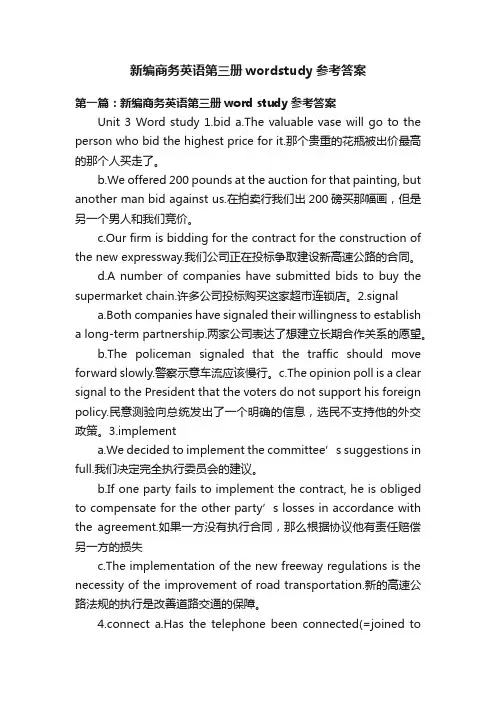
新编商务英语第三册wordstudy参考答案第一篇:新编商务英语第三册word study参考答案Unit 3 Word study 1.bid a.The valuable vase will go to the person who bid the highest price for it.那个贵重的花瓶被出价最高的那个人买走了。
b.We offered 200 pounds at the auction for that painting, but another man bid against us.在拍卖行我们出200磅买那幅画,但是另一个男人和我们竞价。
c.Our firm is bidding for the contract for the construction of the new expressway.我们公司正在投标争取建设新高速公路的合同。
d.A number of companies have submitted bids to buy the supermarket chain.许多公司投标购买这家超市连锁店。
2.signala.Both companies have signaled their willingness to establisha long-term partnership.两家公司表达了想建立长期合作关系的愿望。
b.The policeman signaled that the traffic should move forward slowly.警察示意车流应该慢行。
c.The opinion poll is a clear signal to the President that the voters do not support his foreign policy.民意测验向总统发出了一个明确的信息,选民不支持他的外交政策。
3.implementa.We decided to implement the committee’s suggestions in full.我们决定完全执行委员会的建议。

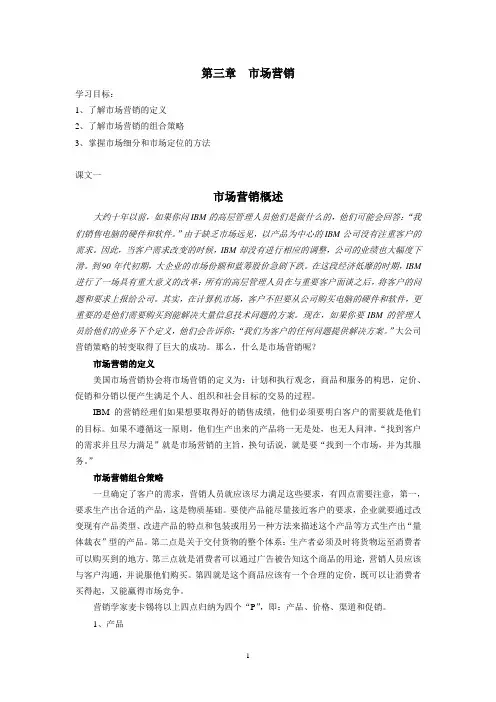
第三章市场营销学习目标:1、了解市场营销的定义2、了解市场营销的组合策略3、掌握市场细分和市场定位的方法课文一市场营销概述大约十年以前,如果你问IBM的高层管理人员他们是做什么的,他们可能会回答:“我们销售电脑的硬件和软件。
”由于缺乏市场远见,以产品为中心的IBM公司没有注重客户的需求。
因此,当客户需求改变的时候,IBM却没有进行相应的调整,公司的业绩也大幅度下滑。
到90年代初期,大企业的市场份额和蓝筹股价急剧下跌。
在这段经济低靡的时期,IBM 进行了一场具有重大意义的改革:所有的高层管理人员在与重要客户面谈之后,将客户的问题和要求上报给公司。
其实,在计算机市场,客户不但要从公司购买电脑的硬件和软件,更重要的是他们需要购买到能解决大量信息技术问题的方案。
现在,如果你要IBM的管理人员给他们的业务下个定义,他们会告诉你:“我们为客户的任何问题提供解决方案。
”大公司营销策略的转变取得了巨大的成功。
那么,什么是市场营销呢?市场营销的定义美国市场营销协会将市场营销的定义为:计划和执行观念,商品和服务的构思,定价、促销和分销以便产生满足个人、组织和社会目标的交易的过程。
IBM的营销经理们如果想要取得好的销售成绩,他们必须要明白客户的需要就是他们的目标。
如果不遵循这一原则,他们生产出来的产品将一无是处,也无人问津。
“找到客户的需求并且尽力满足”就是市场营销的主旨,换句话说,就是要“找到一个市场,并为其服务。
”市场营销组合策略一旦确定了客户的需求,营销人员就应该尽力满足这些要求,有四点需要注意,第一,要求生产出合适的产品,这是物质基础。
要使产品能尽量接近客户的要求,企业就要通过改变现有产品类型、改进产品的特点和包装或用另一种方法来描述这个产品等方式生产出“量体裁衣”型的产品。
第二点是关于交付货物的整个体系:生产者必须及时将货物运至消费者可以购买到的地方。
第三点就是消费者可以通过广告被告知这个商品的用途,营销人员应该与客户沟通,并说服他们购买。
![新编剑桥商务英语中级第三部课本阅读原题与答案[优质ppt]](https://uimg.taocdn.com/dea498dcd4d8d15abf234e07.webp)
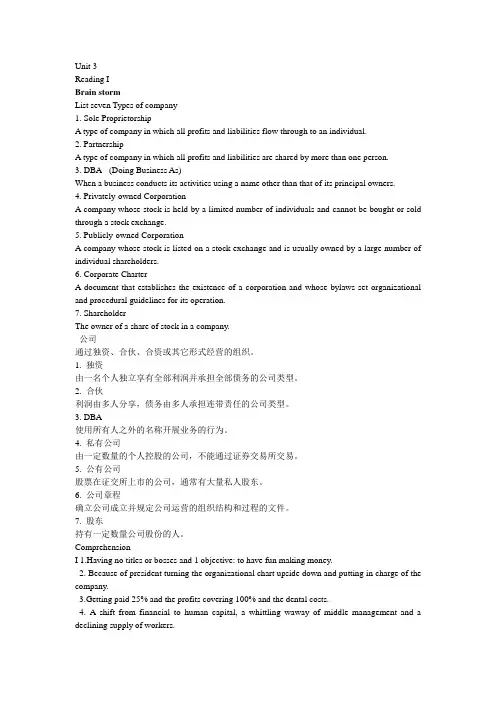
Reading IBrain stormList seven Types of company1. Sole ProprietorshipA type of company in which all profits and liabilities flow through to an individual.2. PartnershipA type of company in which all profits and liabilities are shared by more than one person.3. DBA - (Doing Business As)When a business conducts its activities using a name other than that of its principal owners.4. Privately-owned CorporationA company whose stock is held by a limited number of individuals and cannot be bought or sold through a stock exchange.5. Publicly-owned CorporationA company whose stock is listed on a stock exchange and is usually owned by a large number of individual shareholders.6. Corporate CharterA document that establishes the existence of a corporation and whose bylaws set organizational and procedural guidelines for its operation.7. ShareholderThe owner of a share of stock in a company.公司通过独资、合伙、合资或其它形式经营的组织。
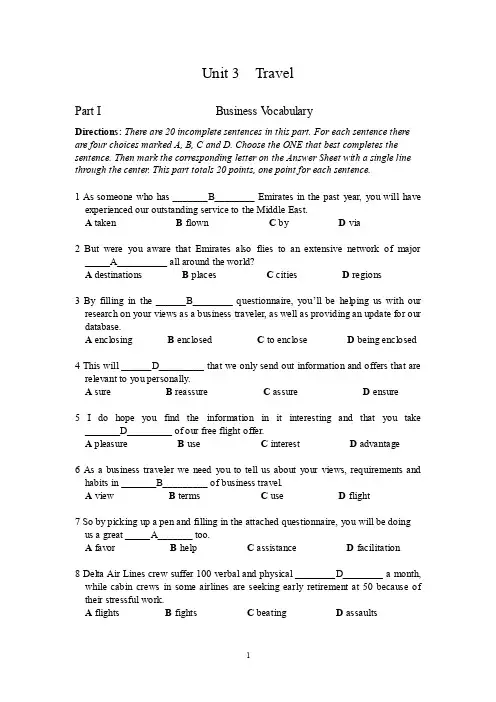
Unit 3 TravelPart I Business V ocabularyDirections: There are 20 incomplete sentences in this part. For each sentence there are four choices marked A, B, C and D. Choose the ONE that best completes the sentence. Then mark the corresponding letter on the Answer Sheet with a single line through the center. This part totals 20 points, one point for each sentence.1 As someone who has _______B________ Emirates in the past year, you will have experienced our outstanding service to the Middle East.A takenB flownC byD via2 But were you aware that Emirates also flies to an extensive network of major _____A__________ all around the world?A destinationsB placesC citiesD regions3 By filling in the ______B________ questionnaire, you’ll be helping us with our research on your views as a business traveler, as well as providing an update for our database.A enclosingB enclosedC to encloseD being enclosed4 This will ______D_________ that we only send out information and offers that are relevant to you personally.A sureB reassureC assureD ensure5 I do hope you find the information in it interesting and that you take _______D_________ of our free flight offer.A pleasureB useC interestD advantage6 As a business traveler we need you to tell us about your views, requirements and habits in _______B_________ of business travel.A viewB termsC useD flight7 So by picking up a pen and filling in the attached questionnaire, you will be doing us a great _____A_______ too.A favorB helpC assistanceD facilitation8 Delta Air Lines crew suffer 100 verbal and physical ________D________ a month, while cabin crews in some airlines are seeking early retirement at 50 because of their stressful work.A flightsB fightsC beatingD assaults9 IDP is a computer software company _______D__________ in Los Angels, USA.A operatedB operatingC basingD based10 They will expect to relax, enjoy the ______C__________ of the hotel, explore thesurrounding area, and have a really good time.A facilitiesB equipmentC amenitiesD infrastructure11 Thank you for your letter of February 8 informing us _______C_____ the packingdetails.A aboutB forC ofD by12 ____C____ reply, we are now confirming the acceptance of your modes of packing.A ForB AtC InD On13 For your information, we have _____A_______ our bank to open an irrevocableletter of creditA instructedB informedC advisedD notified14 We would appreciate _____C______ if you could ship the order as scheduled.A themB youC itD whom15 We are looking forward to ____B______ the consignment in prime condition.A receivedB receivingC receiveD to receive16 We can supply all the bicycles you required ____B________ stock and arearranging shipment by M.V. Mermaid.A forB fromC toD against17 ____B_____ stipulated in our Sales Confirmation No. 593, each bicycle isenclosed in a corrugated cardboard pack.A SinceB AsC ForD Because18 We would like to remind you that the _____A_____ L/C must reach us beforeMarch10 so that we can make shipment in good time.A coveringB coverC coveredD being covered19 We are now confirming the prices ____C______ on the fax of June 15 for ourPhoenix range.A quotingB to quoteC quotedD being quoted20 We have _____D______ every possible precaution to make sure of safetransportation of our products.A preparedB givenC conductedD takenPart II Phrase TranslationDirections: Directions: There are 20 Chinese phrases in this part. You are required to translate them into English and write down your translation on the Answer Sheet. This part totals 20 points, one point for each phrase.1 经济舱Economy Class2 商务舱Business Class3 远东Far East4 中东Middle East5 重要目的地major destinations6 免费优惠券free voucher7 抽奖prize draw8 酒店住宿hotel accommodation9 时差综合症jet lag10 商务之旅business travel11 新产品系列new collection12 全球问题a world-wide problem13 身体攻击physical assaults14 大众旅游mass travel15 安全问题safety issue16 高档区域exclusive area17 机票费air fare18 销售税sales tax19 软件公司software company20 团队建设研讨会a team-building seminarPart III Sentence TranslationDirections: There are 10 sentences in this part. You are required to translate them into Chinese and write down your translation on the Answer Sheet. This part totals 20 points, two points for each sentence.1.As someone who has flown Emirates in the past year, you will have experiencedour outstanding service to the Middle East.作为去年乘坐过阿联酋航空公司航班的乘客,您已经体验了我们公司中东之行的杰出服务。

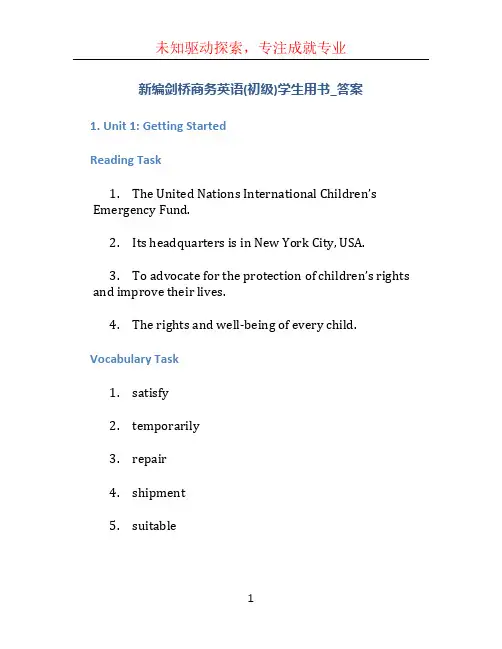
新编剑桥商务英语(初级)学生用书_答案1. Unit 1: Getting StartedReading Task1.The United Nations International Children’s Emergency Fund.2.Its headquarters is in New York City, USA.3.To advocate for the protection of children’s rights and improve their lives.4.The rights and well-being of every child. Vocabulary Task1.satisfy2.temporarily3.repair4.shipment5.suitableListening Task1.False2.True3.True4.False5.False2. Unit 2: CommunicationReading Task1.People working in multinational companies.2.Because of differences in culture, customs, and business practices.3.Cultural sensitivity, adapting communication style, and understanding non-verbal communication.4.Polite greetings, appropriate dress code, and being punctual.Vocabulary Task1.manage2.appropriate3.gesture4.moderate5.standardListening Task1.C2.B3.A4.B5.A3. Unit 3: Business TravelReading Task1.It helps to establish and maintain business relationships.2.Making hotel reservations, booking flights, and arranging transportation.3.They need to be aware of local customs, etiquette, and have knowledge of the local language.4.Preparation, documentation, and being organized. Vocabulary Task1.navigate2.accommodation3.confirm4.transport5.locateListening Task1.B2.A3.C4.B5.C4. Unit 4: Company OrganizationReading Task1.To understand the structure, roles, and responsibilities within a company.2.It provides a clear understanding of the hierarchical structure within a company.3.It helps to ensure effective communication and coordination between different departments.4.Functions, departments, and positions. Vocabulary Task1.assign2.colleague3.document4.policy5.superviseListening Task1.C2.A3.B4.C5.A5. Unit 5: Job InterviewsReading Task1.It is an opportunity for employers to evaluate the suitability of candidates for a specific job position.2.Preparing for commonly asked questions and practicing good body language.3.Being well-groomed, dressing appropriately, and being confident.4.Asking relevant questions and expressing gratitude for the opportunity.Vocabulary Task1.evaluate2.relevant3.confident4.opportunity5.gestureListening Task1.C2.B3.A4.B5.A6. Unit 6: Telephone SkillsReading Task1.It is a commonly used tool in business communications.2.To ensure effective communication and maintain good business relationships.3.Answering professionally, speaking clearly, and paying attention to tone and pace.4.Taking messages, transferring calls, and resolving issues.Vocabulary Task1.effectively2.professional3.manner4.transfer5.issueListening Task1.B2.C3.A4.B5.C7. Unit 7: Emails and Writing SkillsReading Task1.Emails are used for quick and efficient communication.2.Formal and informal emails.3.Subject line, greeting, body, and closing.4.Being concise, using proper grammar and punctuation, and proofreading.Vocabulary Task1.efficient2.formal3.grammar4.proofread5.conciseListening Task1.C2.B3.A4.B5.A8. Unit 8: PresentationsReading Task1.To effectively communicate information, ideas, and proposals to a group of people.2.Planning, creating visual aids, and practicing the delivery.3.Confidence, eye contact, and engaging with the audience.4.Structuring the presentation, using visual aids, and answering questions.Vocabulary Task1.effectively2.visual3.audience4.engage5.structureListening Task1.B2.C3.A4.B5.C9. Unit 9: Business CorrespondenceReading Task1.It is written communication between businesses or individuals.2.To provide information, make inquiries, and establish business relationships.3.Proper salutation, clear and concise content, and professional closing.4.Business letters, memos, and emails.Vocabulary Taskmunication2.inquiries3.content4.professional5.memosListening Task1.A2.C3.B4.C5.A10. Unit 10: Socializing and EntertainmentReading Task1.It helps to build rapport and strengthen business relationships.2.Attending social events, dining out, and participating in recreational activities.3.Appropriate behavior, cultural sensitivity, and beinga good listener.4.Small talk, cultural knowledge, and expressing gratitude.Vocabulary Task1.strengthen2.appropriate3.behavior4.listener5.gratitudeListening Task1.C2.B3.A4.B5.CThis is the answer key for the New Cambridge Business English (Ele mentary) Student’s Book.。

新版剑桥商务英语高级第三版课后答案unit31、With all the work on hand, he _____ to the cinema last night. [单选题] *A.should goB.must have goneC.might goD..shouldn’t have gone(正确答案)2、My brother is _______ actor. He works very hard. [单选题] *A. aB. an(正确答案)C. theD. one3、His mother’s _______ was a great blow to him. [单选题] *A. diedB. deadC. death(正确答案)D. die4、The work will be finished _______ this month. [单选题] *A. at the endB. in the endC. by the endD. at the end of(正确答案)5、There _______ no water or milk in the fridge. [单选题] *A. is(正确答案)B. areC. hasD. have6、This year our school is _____ than it was last year. [单选题] *A. much more beautiful(正确答案)B. much beautifulC. the most beautifulD. beautiful7、74.No person ()carry a mobile phone into the examination room during the national college Entrance Examinations.[单选题] *A.shall(正确答案)B.mustC.canD.need8、______ pocket money did you get when you were a child? ()[单选题] *A. WhatB. HowC. How manyD. How much(正确答案)9、—Could you take out the rubbish, Jim?—______. I have too much homework to do. You can ask Sally to do it. ()[单选题] *A. Sorry, I can’t(正确答案)B. No problemC. I disagreeD. No, thanks10、I repeated my question several times. [单选题] *A. 到达B. 惊奇C. 重复(正确答案)D. 返回11、73.()about the man wearing sunglasses during night that he was determined to follow him.[单选题] *A. So curious the detective wasB.So curious was the detective(正确答案)C.How curious was the detectiveD.How curious the detective was12、What _______ would you like, sir? [单选题] *A. otherB. else(正确答案)C. othersD. another13、48.—________ is your new skirt, Lingling?—Black. [单选题] *A.HowB.What colour(正确答案)C.WhichD.Why14、I do not have my own room,_____. [单选题] *A. neither does Tom(正确答案)B. neither has TomC. so does TomD. so has Tom15、Ships can carry more goods than _____ means of transport. [单选题] *A. the otherB. anotherC. any other(正确答案)D. any16、( ). The old man enjoys ______ stamps. And now he has1300 of them [单选题] *A. collectB. collectedC. collecting(正确答案)D. to collect17、She often _______ at 21: [单选题] *A. go to bedB. gets upC. goes to bed(正确答案)D. gets to18、63.There will be? ? ? ? ??? water on the road after the heavy rain. [单选题] *A.too much(正确答案)B.much tooC.too manyD.many too19、Will you be able to finish your homework _______? [单选题] *A. by the timeB. in time(正确答案)C. once upon a timeD. out of time20、I should like to rent a house which is modern, comfortable and _____, in a quiet neighborhood. [单选题] *A.in allB. after allC. above all(正确答案)D. over all21、You have been sitting on my hat and now it is badly out of(). [单选题] *A. dateB. shape(正确答案)C. orderD. balance22、Ladies and gentlemen, please fasten your seat belts. The plane _______. [单选题] *A. takes offB. is taking off(正确答案)C. has taken offD. took off23、Before you quit your job, ()how your family will feel about your decision. [单选题] *A. consider(正确答案)B. consideringC. to considerD. considered24、We were caught in a traffic jam. By the time we arrived at the airport the plane _____. [单选题] *A. will take offB. would take offC. has taken offD. had taken off(正确答案)25、79.On a ________ day you can see the city from here. [单选题] *A.warmB.busyC.shortD.clear(正确答案)26、My daughter is neither slim nor fat and she’d like a _______ skirt. [单选题] *A. largeB. medium(正确答案)C. smallD. mini27、You can _______ Bus 116 to get there. [单选题] *A. byB. take(正确答案)C. onD. in28、87.—Could you? ? ? ? ? ? me the way to the nearest hospital?—Sure. [单选题] * A.askB.tell(正确答案)C.talkD.speak29、He often comes to work early and he is _______ late for work. [单选题] *A. usuallyB. never(正确答案)C. oftenD. sometimes30、The children ______ visiting the museum. [单选题] *A. look overB. look forward to(正确答案)C. look forD. look after。